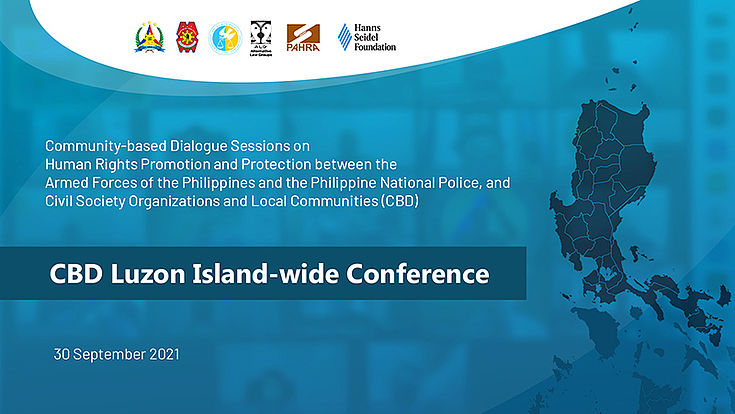Community-based Dialogues (CBD)
CBD holds Luzon Island-wide Conference
CBD Luzon Island-wide Conference
HSF
The objective is to share updates on accomplishments, challenges and gaps, strengths and best practices, and lessons learned on three (3) key areas: building collaboration among multi-stakeholders and institutionalization of the CBD program; addressing human rights violations; and human rights education, capacity building and advocacy.
The activity was well attended with 70 participants from Luzon island including representatives from partner institutions at the national level (CHR, PNP, AFP, ALG, PAHRA, HSF).
CHR PAO’s Division Chief, Atty. Raymund Rosuelo gave the opening remarks and welcomed the participants to the virtual conference.
The conference was a good opportunity to learn from the partners on their CBD activities and stakeholders involved on the ground. It is worthy to note that the partners find the CBD an effective tool/mechanism to address human rights issues and concerns at the localities in a judicious manner.
In terms of achievements, strengths and best practices, they stated the following: strengthened ties with CSOs, POs, LGUs as well as the AFP and PNP; improved relations with duty-bearers; effectively recognized the importance of collaborative effort in resolving human rights abuses and violations; listened to the sentiments of every sector of society and devise an action plan from it; human rights issues are being addressed early on and assessments help craft policies and recommendations to mitigate and respond to emerging crises; conduct of CBDs and resolution of issues (civil, political, economic, cultural & social rights); conduct of human rights orientation/education/training programs; hosting barangay-level dialogues; participation in Regional Development Council (RDC) sectoral and support committees (RDC Resolution No. IV-A-165-2018 – Institutionalization of the Conduct of CBD Sessions); information dissemination (hotlines, social media); local and international networking/ alliance-building (cooperation with academe on human rights education/extension program; partnerships with concerned stakeholders/sectors); volunteerism; maintaining/sustaining rapport with police/military command officers; strong/reliable relationship with LGUs and national government agencies; successful collaborative efforts with multi-stakeholders through the CBDs; CBDs are used as preventive mechanism against commission of HRVs and bridge the gap between the community and government offices; timely and relevant topics of CBD sessions; Community Support Program of AFP; active participation in CBD program by different agencies; openness and respect for each sector is reached; constant collaboration and coordination with stakeholders; human rights module is incorporated in curriculum of security sector’s training; issuance of policy advisories; Human Rights desk in police stations; monitoring of HRVs committed by AFP/PNP personnel.
As to challenges and gaps, the following were observed: limited engagements/low turnout of participants due to COVID-19 health pandemic/fear of exposure; negative perception on human rights; target participants are hesitant to join online activities; fast turnover of military personnel; maintaining regular membership in core groups affecting coordination and continuity of projects/inconsistent representation; failure to report HRV due to fear of retaliation; uncooperative stakeholders; inaccessibility of CHR in obtaining some documents; timely actions to human rights issues and concerns; immediate documentation and proper recording of HRV cases and conference with concerned people; funding source; suspicion against CSOs by LGU/ community; communication gap; misinterpretations on issue of “red-tagging;” lack of feedback mechanism in monitoring the impact of CBD; some community members are suspicious of uniformed personnel.
With respect to lessons learned and recommendations, they stressed the following: the CBD program is an effective tool in checking the human rights situation; it is a medium where pressing issues can be traced and resolved; sustain CBD/broader participation of concerned sectors (VAW Desk Officers, LGU); develop appropriate IEC materials; continuous capacity-building of CBD core group; funding for regular and special meetings of CBD core group; intensify information/education campaign; provide a preventive mechanism to combat cases of HRVs; raise awareness about CBDs and continuous engagement among stakeholders as human rights are evolving; local legislators, Center for Human Rights Education (CHRE) and Barangay Human Rights Action Center (BHRAC) play an important role in the conduct of CBDs; there should be a standardized referral form that would contain all the important information; conduct FGDs with participants once a year to verify the impact of the CBDs; enter MOA/MOU with stakeholders; synchronization of plans and efforts among government agencies; institutionalization of CBD program; diligent filing of appropriate cases in court is a must in addressing HRVs; open communication is a must in addressing HRVs; institutionalize HRAC and CBD thru an ordinance by the Sangguniang Bayan; inclusion of human rights education in curriculum of academic institutions through CHED and DepEd.
After the open forum, CHR-V Regional Director, Atty. Arlene Alangco delivered the closing remarks.

